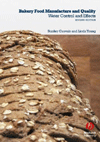Royal DSM, a global science-based company in Nutrition, Health and Sustainable Living, has published a new report in its Global Insights Series which indicates that consumers are still largely unaware of acrylamide—but those who do know something about acrylamide, know enough to be concerned. DSM’s survey, conducted amongst consumers in France, Germany, the UK and the USA, shows that once knowledgeable about acrylamide, consumers expect food manufacturers to find solutions.
Acrylamide is a suspected carcinogen that forms in foods with reducing sugar that are processed at a high temperature, such as cookies or tortilla chips. Many food manufacturers have already taken significant steps to reduce acrylamide levels in their products, but recent regulatory changes and increasing public awareness about acrylamide is prompting even further action. The results of DSM’s consumer survey show there is still room for the food industry to claim a leadership role in acrylamide reduction.
“While acrylamide is still relatively ‘under the radar’ for many consumers, the topic is quickly gaining attention through major media outlets in the US and Europe,” says Fokke van den Berg, business director for Baking at DSM. “Our research shows that once consumers are informed about acrylamide, they want manufacturers—more than regulators—to take action to reduce acrylamide levels.”
According to DSM’s survey, a high 54 percent of people in Germany are aware of acrylamide, but that number dips to an average of just 12 percent in France, the UK, and the US. Most of these informed consumers (64%) have decided to take action to reduce their acrylamide consumption, such as by adjusting their cooking behavior. Around half of those surveyed believe the responsibility for acrylamide levels in the products they buy sits with food manufacturers, and just 28 percent believe regulators should take responsibility.
The full report based on DSM’s survey can be downloaded from www.dsm.com.







